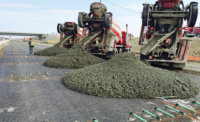Fiber-reinforced polymer composites, high-performance concrete and other innovative materials and technologies appear to be fulfilling their promise to reduce infrastructure maintenance and life-cycle costs, and cut construction time, according to a recently released Transportation Research Board consensus study.
Commissioned under the FAST Act of 2015, the study analyzed the performance of nearly 400 construction and repair projects in 20 states from 1999 to 2005 as part of the Federal Highway Administration’s (FHWA) Innovative Bridge Research and Construction Program (IBRC). The program included approximately 150 bridge projects.
Although incomplete data precluded the study’s authors from making detailed life-cycle cost comparisons of materials and techniques, they concluded that, based on information on physical properties of innovative materials used in IBRC projects, as well as published cost comparisons and acceptance of several IBRC technologies in state highway programs, it was “likely” the program contributed to reduce costs.
Accelerated bridge construction and monitoring technology, also part of the IBRC program, “could produce much greater savings if used more widely in appropriate applications,” according to the study authors.
The study also noted that materials such as high-performance steel and concrete, stainless steel rebar and externally bonded FRP reinforcement have achieved general acceptance in state highway bridge programs. Some technologies, such as FRP deck and superstructure elements, will require further development and evaluation before their correct use and full potential can be determined, the study said.
Still, Tom Dobbins, president of the American Composite Materials Association, asserts that FRP composites “are no longer ‘innovative,’ but rather a standard, best-in-class material.”
“Engineers can specify components with confidence that they’re using validated materials,” Dobbins adds.
To help accelerate the adoption of these materials and technologies, the study calls for a new federal grant program to provide incentives for innovation in bridge construction, as well as continued funding of FHWA’s Center for Accelerating Innovation and the establishment of state-level research and demonstration programs.





Post a comment to this article
Report Abusive Comment